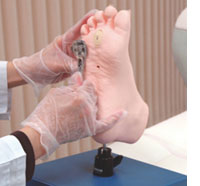|
|
|
Jarrod Shapiro, DPM
Practice Perfect Editor
Assistant Professor
Dept. of Podiatric Medicine
Surgery & Biomechanics
College of Podiatric Medicine
Western University of
Health Sciences
St. Pomona, CA |
Generally speaking, I feel I am a relatively easy attending with which to work. I imagine that for my students, my opinion may or may not be an accurate description of reality. For many attendings, though, working with neophyte doctors can be very trying. The challenging part is deciding when to allow a trainee to learn a new skill or take on new responsibility, while at the same time balancing patient safety and satisfaction. Medical simulation is an educational method that might make these concerns a thing of the past. In our two-part series, I'd like to discuss the current state of affairs of medical simulation and then propose a vision for the future. I hope to provoke your thoughts on this very interesting subject.

Currently...
Take a simple clinical skill all of our podiatric students must master while in school: digital anesthetic blocks. Due to an unfortunate rule of my University, the podiatric students are not allowed to perform local anesthetic blocks on each other. As a result, the first chance our students have to gain experience with this skill is on my patients. This can be somewhat problematic, because many patients do not want inexperienced doctors "practicing" on them. On the other hand, I have to balance the needs of my students. With respect and a little finesse, we can usually navigate these treacherous waters without too much trouble.
Consider, then, a potentially more complex skill set: surgery. I'm certain many of our readers who work with students and residents can attest to the nervous moment when we pass the scalpel off to our trainees. Consider also that there are components of surgery that have varying complexity. Dissection requires different physical skills than performing osteotomies, just as reconstruction requires different skills than amputations. It's no wonder that many attending surgeons would rather work with senior residents.
When working with new trainees, I ask myself 3 simple questions when deciding how much work, if any, I allow them to do:
- If they mess up can I fix it? If I can't fix what the trainee does, then I won't let them do it.
- Has the trainee demonstrated the appropriate attitude and knowledge? If the trainee has not taken the time to understand the purpose of the procedure, pertinent patient information, and basic surgical knowledge, then they're not allowed to come near my patient.
- Has the trainee demonstrated the physical skills leading up to the new skill? I would never allow a resident to perform an osteotomy unless they can demonstrate suturing, dissection, and general saw-handling skills.
Granted, this is not a perfect system, but it's the best I currently have to allow someone without prior experience to gain new skills, with as little risk to my patients as possible. Is there a better system? Is there a method that would allow new trainees to gain experience in a less stressful environment that is risk-free to both residents and patients? Of course there is! It's called medical simulation.
Medical simulation technology has the potential to revolutionize the way we do skills training at the student, resident, and practicing physician level. Medical simulation takes on many forms, some of which we'll review in next week's issue of Practice Perfect. I'll also propose taking medical simulation to new heights in the podiatric world. Adopting simulation to a greater extent will truly be a step in the right direction.
Best wishes.

Jarrod Shapiro, DPM
PRESENT Practice Perfect Editor
[email protected]
Get a steady stream of all the NEW PRESENT Podiatry
eLearning by becoming our Facebook Fan.
Effective eLearning and a Colleague Network await you. |
 |
This ezine was made possible through the support of our sponsors: |
|